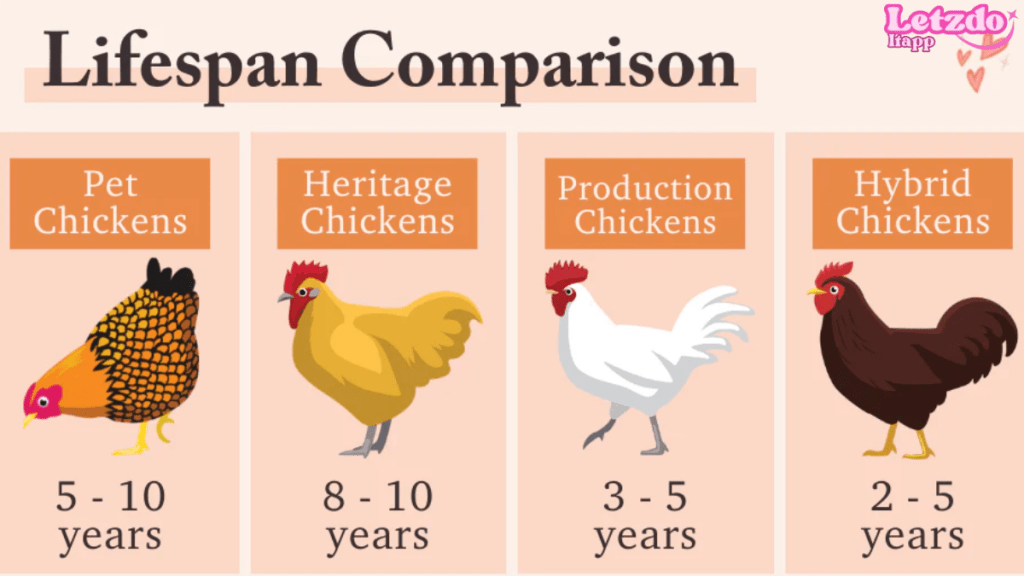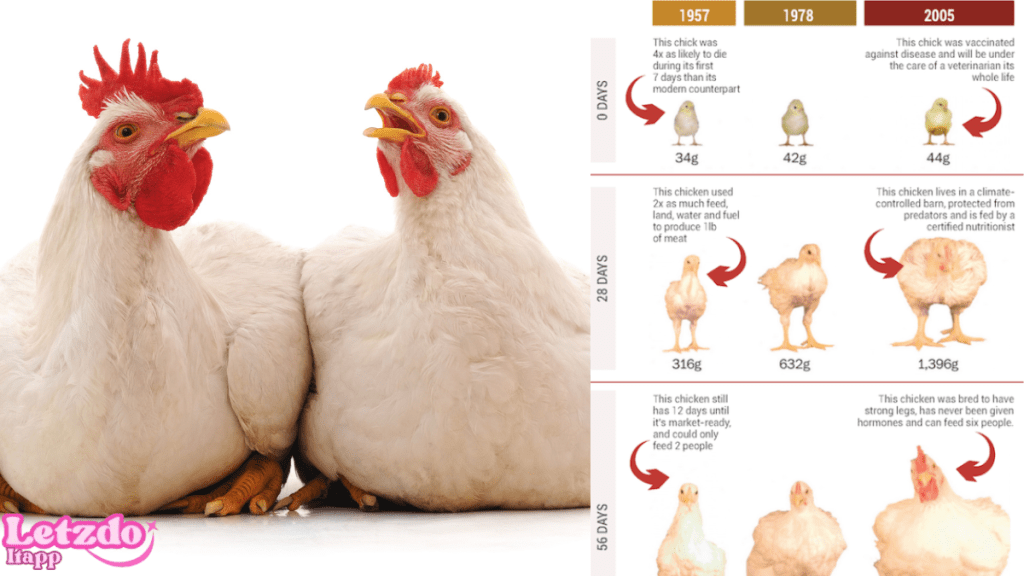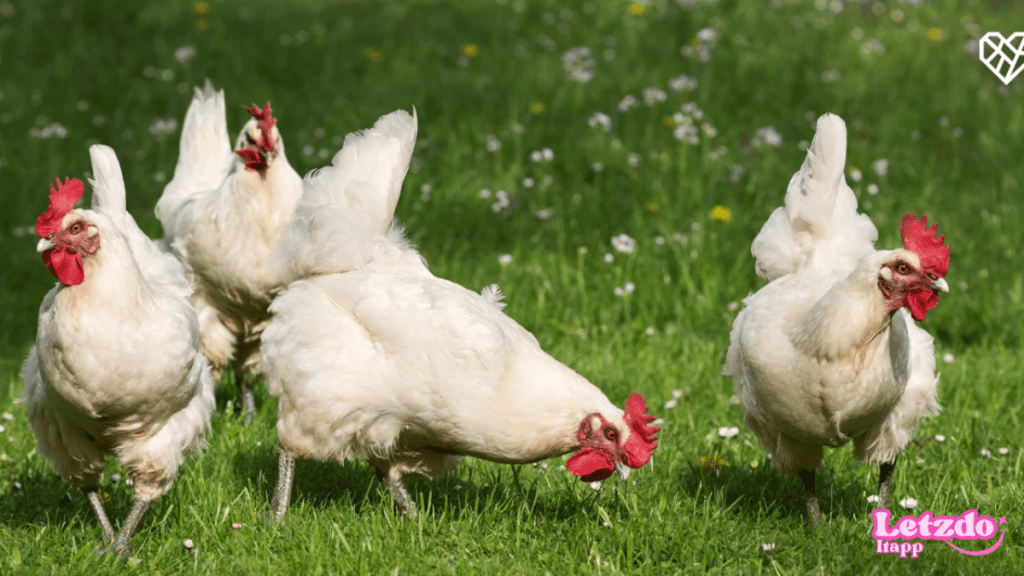Table of Contents
Chickens are more than just egg-layers and cluckers roaming around the backyard. Many people are curious about how long chickens live and what they can do to help their chickens live a long, happy life. Chickens, like any other pet, require proper care and attention to thrive. In this article, we’ll uncover how long chickens typically live, what affects their lifespan, and some amazing facts about keeping chickens healthy.
How Long Do Chickens Live?

The lifespan of a chicken can vary based on several factors. On average, most chickens live between 5 and 10 years. However, some chickens may live even longer with the right care and environment. The exact answer to how long chickens live depends on their breed, living conditions, and how they’re cared for.
Factors that Affect a Chicken’s Lifespan
- Breed: Some chicken breeds are known to live longer than others. Heritage breeds, for example, tend to have longer lifespans compared to broiler chickens bred for meat production.
- Living Conditions: A chicken raised in a clean, predator-free environment will have a better chance of living longer than one exposed to constant dangers or poor living conditions.
- Diet: Chickens need a balanced diet to thrive. Providing them with proper nutrition helps keep them healthy and strong, extending their life expectancy.
- Healthcare: Regular check-ups, vaccinations, and quick action when illnesses arise can also contribute to a chicken’s lifespan.
Surprising Lifespan Records

While the average lifespan of chickens is 5 to 10 years, some have lived much longer under ideal circumstances. The record for the oldest chicken is Matilda, who lived to be 16 years old. Matilda didn’t lay any eggs, which may have contributed to her long life, as laying eggs can be taxing on a chicken’s body.
Many chicken owners are surprised to learn that their backyard friends can live for more than a decade with the proper care and attention. This proves that how long chickens live can be much longer than most people expect when provided with love and care.
How to Help Chickens Live Longer
Caring for chickens is about more than just throwing them some feed each day. To truly help your chickens live a long and healthy life, you need to pay attention to their needs.
- Provide a Safe Environment
Keeping your chickens safe from predators is one of the most important steps in extending their lifespan. Make sure their coop is sturdy and secure, especially at night when predators are more likely to roam. A strong fence and well-built coop will keep dangers at bay and give your chickens peace of mind.
- Offer a Balanced Diet
Chickens thrive on a diet rich in grains, vegetables, and protein. Commercial feed is a good staple, but adding fresh greens and treats like mealworms can boost their health. Clean, fresh water should always be available, as dehydration can cause serious health problems.
- Ensure Proper Healthcare
Just like any other pet, chickens need healthcare to live their best lives. Regular worming, vaccinations, and dusting for mites can prevent common illnesses. If a chicken looks sick or starts behaving differently, a quick trip to the vet could make all the difference.
- Encourage Exercise
Chickens are active animals that love to scratch, peck, and explore. Allowing them space to roam and engage in their natural behaviors will not only make them happy but also contribute to their overall health. A bored chicken may become unhealthy, so it’s important to give them room to move around.
Fun Facts About Chicken Lifespan
Chickens are full of surprises! Here are a few fun facts about how long chickens live and their fascinating nature:
- Broiler chickens, bred for meat, typically have a shorter lifespan, often residing less than two years. This is because they are bred to grow quickly, which can lead to health issues.
- Egg-laying chickens usually live around 5 to 7 years, with their egg production slowing down after 2 to 3 years.
- Heritage breeds, such as the Plymouth Rock or Rhode Island Red, are known to live longer due to their hardiness and slower growth rates.
- Chickens can recognize human faces and form bonds with their owners. This can lead to a happier life, as chickens enjoy interacting with familiar faces.
Tips for a Healthy Chicken Flock

Keeping chickens healthy is essential for extending their lifespan. Below are some key tips to ensure your flock stays in top shape:
- Regular Cleaning: A clean coop is a must for a long-living chicken. Dirty coops can lead to disease, parasites, and an overall unhealthy environment.
- Inspect for Illness: Be on the lookout for any signs of sickness, such as lethargy, a drop in egg production, or unusual behavior. Early detection is key to preventing the spread of illness.
- Keep the Flock Size Manageable: Overcrowded conditions can cause stress and lead to fights among chickens. Ensuring each chicken has enough space will contribute to their well-being.
Also read: How Long Does It Take for Bangs to Grow Out? Shocking Truth!
How Long Do Chickens Live Compared to Other Birds?
When comparing how long chickens live to other birds, their lifespan is relatively modest. Parrots and other pet birds can live for decades, with some species living up to 50 years. However, chickens have shorter lifespans due to their role as domesticated animals. Their lifespan is still impressive, considering their size and the environments they live in.
Also read: How Long Do Chickens Live? Amazing Facts!
Chickens, on average, live between 5 and 10 years, but some lucky ones can live even longer under ideal circumstances. Whether you’re raising chickens for eggs, companionship, or simply as a hobby, giving them the best care possible is key to helping them thrive. By offering a safe environment, balanced diet, proper healthcare, and plenty of room to roam, you can help your chickens enjoy a long, happy life.





